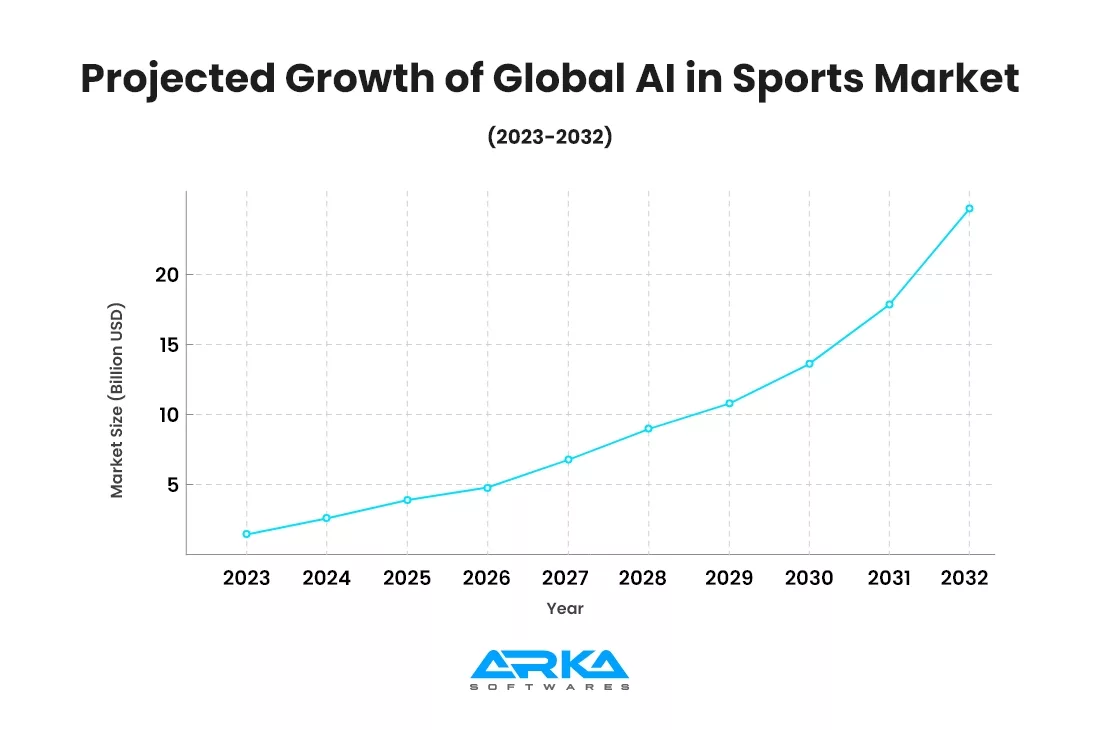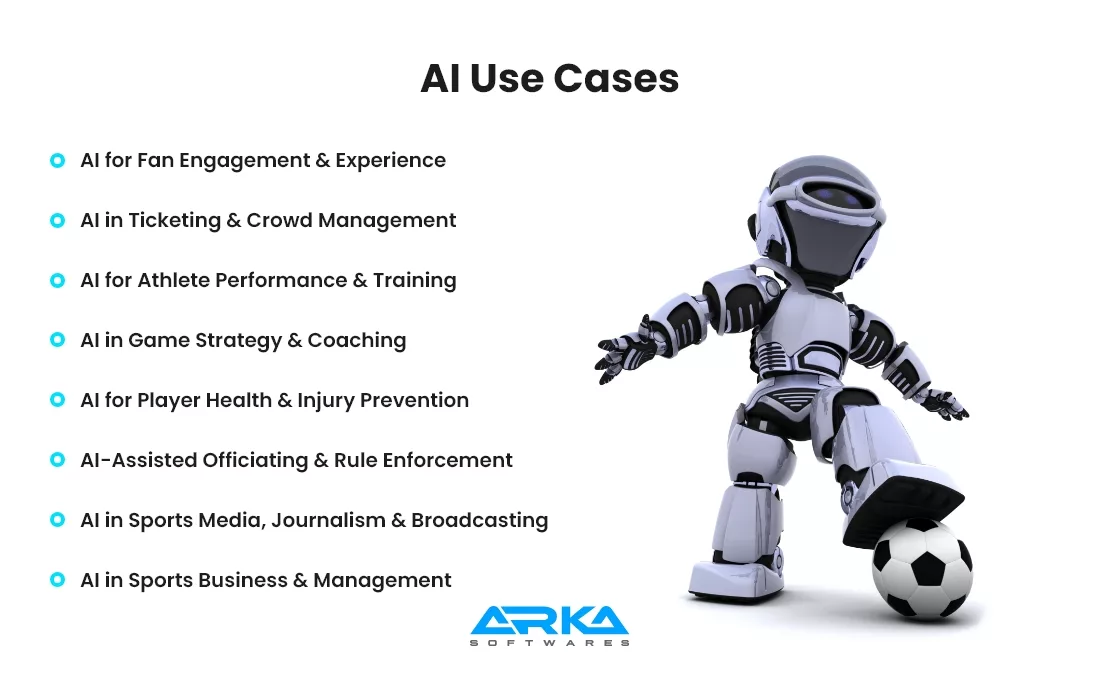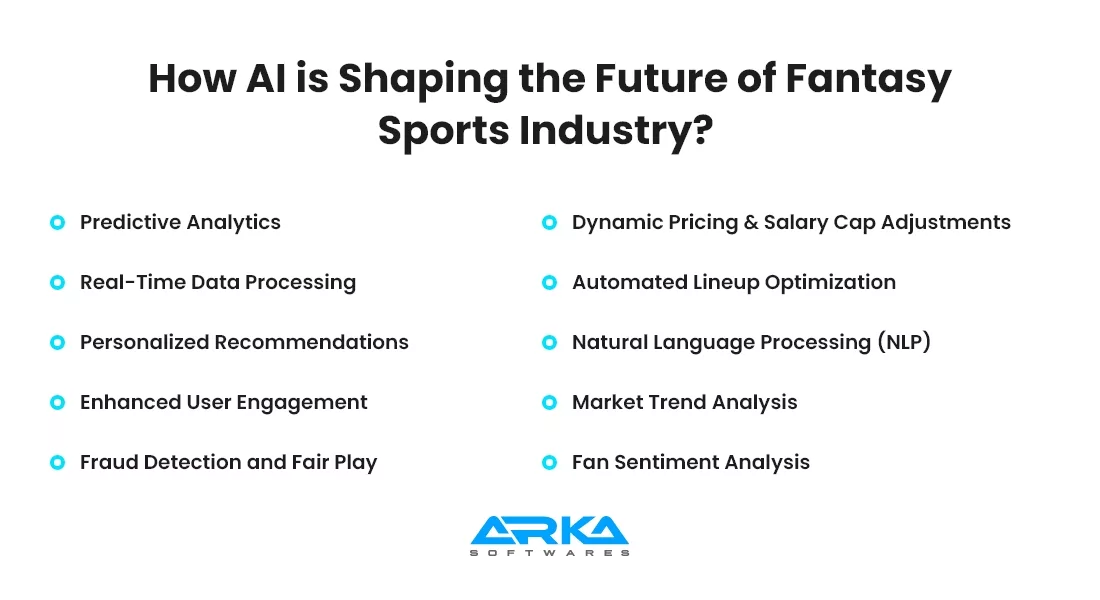In recent years, Artificial Intelligence (AI) has taken the sports world by storm—and it’s not just helping pro athletes anymore. From locker rooms to living rooms, AI is now making big plays in AI in Fantasy Sports, turning casual fans into data-driven strategists.
Gone are the days of gut-feeling picks and lucky guesses. AI can analyze mountains of stats, track player performance trends, predict outcomes, and help fans make smarter decisions in their fantasy leagues. It’s like having a personal sports analyst in your pocket.
And this isn’t just hype. The global sports analytics market is sprinting toward a $4.5 billion finish line, proving that data is the new MVP of sports strategy. With the help of machine learning and smart algorithms, fantasy players can now uncover insights that were once only available to professional coaches and scouts.
Ready to see what’s possible when technology meets your team? In this blog, we’ll break it all down in a fun, easy way—starting with the benefits of AI in fantasy sports, the real-world use cases, common challenges, and more. Let’s explore how AI is transforming the fantasy sports arena, one stat at a time.
Artificial intelligence is no longer a fringe innovation in sports, it’s a central force reshaping how athletes train, how games are played, and how fans connect. From player performance to officiating accuracy and immersive fan experiences, Fantasy Sports App with AI is revolutionizing the sports ecosystem.
With increasing investments and groundbreaking innovations, the global sports industry is rapidly embracing AI to gain a competitive edge.
The integration of AI in sports is accelerating at a remarkable pace. The data speaks volumes about its impact and the industry’s growing reliance on intelligent systems:
These statistics confirm that AI isn’t just a trend—it’s a transformative force that’s fundamentally reshaping modern sports.
The explosive growth of AI in sports is backed by a surge in investments from tech giants, startups, and sports leagues eager to unlock the full potential of data-driven innovation.
Key Market Growth Drivers

Current Investment Trends
AI Applications in Fantasy Sports are increasingly becoming standard across elite sports leagues and major international tournaments, elevating the quality, precision, and personalization of sports experiences.
AI Integration in Leading Sports Organizations
AI at Major Global Sporting Events
The future of AI in Fantasy Sports App Development is brimming with potential. Emerging technologies such as real-time predictive analytics, AI-assisted broadcasting, and wearable intelligence are expected to further revolutionize training, fan engagement, and strategic planning.
As AI adoption deepens, sports organizations that harness the power of intelligent technologies will gain a significant edge enhancing performance, operational efficiency, and audience loyalty. The role of AI in fantasy sports app development and integration of AI isn’t just about keeping up; it’s about staying ahead.
AI analyzes past performance, player data, and conditions to predict injuries and game outcomes. This helps teams adjust strategies, optimize lineups, and make real-time decisions, giving them a competitive edge based on accurate, data-driven insights.
AI-powered VR simulates real game situations for athlete training, while AR enhances fan experience with real-time stats and visuals. These technologies boost skill development and deliver a more engaging, interactive way to watch sports.
AI replaces traditional scouting with smart analytics, reviewing performance data, video, and external indicators. Teams can assess talent more objectively and efficiently, making smarter recruitment choices while reducing human bias and resource demands.
AI’s use in sports raises concerns around data privacy, especially from wearables, and potential misuse in betting. Strong regulations are essential to protect athlete data, maintain fair play, and prevent unethical applications of predictive AI.
AI-powered gear like smart shoes and rackets tracks movement, power, and technique. Athletes receive instant performance feedback, helping improve skills, reduce injuries, and personalize training for faster, safer athletic development.
To know what exactly AI is doing in the fantasy sports market. Given below are the AI use cases in fantasy sports industry.
AI enhances fan experience through personalized content, chatbots, and predictive match insights. Platforms use machine learning to recommend videos, fantasy picks, or merchandise, keeping fans engaged across digital channels. AI also powers immersive experiences like AR/VR for deeper interaction with teams, players, and live events.
Fantasy Sports App with AI optimizes ticket pricing using demand forecasting and real-time analytics. For crowd control, computer vision and predictive modeling assist in entry flow, seating arrangements, and emergency response. Smart systems improve stadium safety, reduce wait times, and provide smoother experiences from ticket purchase to post-game exit.
AI Applications in Fantasy Sports analyzes motion, biometrics, and training loads to personalize workouts and correct technique. Using wearables and video feedback, AI helps athletes refine form, track progress, and avoid overtraining. Coaches use this data to tailor programs, ensuring maximum performance with minimal risk of fatigue or injury.
AI-powered Fantasy Sports Apps evaluates opponent tendencies, game patterns, and player data to inform tactical decisions. Coaches use simulation tools and predictive analytics to test strategies and adjust formations in real time. AI also identifies key play moments, helping refine team dynamics and decision-making under competitive pressure
Machine learning models predict injury risks by analyzing workload, movement, and biometric data. Fantasy Sports AI Use Cases like AI for player health & injury prevention monitors fatigue and recovery patterns, alerting staff before injuries occur. This proactive approach reduces downtime, enhances player longevity, and ensures optimal health throughout long and physically demanding seasons.
AI-powered Fantasy Sports Apps systems like Hawk-Eye and VAR use computer vision to make precise, unbiased decisions on goals, fouls, and offside calls. These tools support referees by minimizing human error and increasing transparency. Real-time data ensures fair play, faster decisions, and greater trust in officiating outcomes.
AI automates content creation, producing highlights, commentary, and articles using NLP and computer vision. Broadcasters use AI to generate dynamic graphics and insights during live games. Personalized news feeds, story summaries, and auto-translations expand access to sports content across languages and platforms.
Fantasy Sports App with AI helps teams and leagues with business operations like sponsorship optimization, fan segmentation, and revenue forecasting. It predicts merchandise trends, improves marketing ROI, and manages athlete contracts using data-driven analysis. AI also supports financial planning and strategic decision-making across sports organizations and franchises.

As mentioned below are some pointers on how AI is shaping the future of fantasy sports industry:
AI uses historical data, player performance, and game statistics to forecast future outcomes. This enables users to make more informed decisions when creating lineups, leading to better strategic gameplay and increased chances of winning fantasy contests.
AI processes live game data in real-time to provide instant updates, player stats, and injury reports. This helps fantasy players make quick decisions, adjust their lineups efficiently, and stay ahead during live contests or drafts.
AI algorithms analyze individual user behavior and preferences to suggest tailored player picks, trades, or strategies. This personalized experience increases user engagement, satisfaction, and retention on fantasy sports platforms.
AI-powered chatbots and content engines provide instant responses, insights, and entertainment. This continuous interaction keeps users engaged, builds community, and ensures higher platform activity even when games aren’t live.
AI detects suspicious activities, multi-accounting, and unfair tactics by monitoring patterns and user behavior. This fosters a trustworthy and fair gaming environment, which is crucial for user confidence and platform integrity.
AI helps in setting realistic player prices or adjusting salary caps based on form, injuries, or performance trends. This keeps the contests competitive and mirrors real-world changes more accurately.
AI tools can auto-generate optimized lineups by evaluating various statistical models and constraints. This helps beginners compete effectively and reduces the time needed for seasoned players to build their teams.
NLP enables users to interact with fantasy platforms via ai voice commands or chat. It also helps in summarizing game highlights, news, or player analysis in user-friendly language, improving the overall user experience.
AI examines user trends, game popularity, and market behavior to suggest which leagues or contests to promote. This helps fantasy platforms stay agile, relevant, and better aligned with user interests.
AI tracks fan emotions from social media, forums, or news to evaluate public sentiment about players or teams. This data informs player valuations and adds an emotional edge to analytical decision-making.

To know what the real-world examples of AI implementation in fantasy sports app are given below is the information about it:
As mentioned below are the benefits of AI in fantasy sports explained in detail. To know more about it lets get through it:
AI can process and analyze massive volumes of performance data in real time. This enables coaches and trainers to evaluate a player’s strengths, weaknesses, and overall progress with remarkable precision. Fantasy sports app like sleeper uses real-time feedback through AI-powered tools and allows athletes to tweak their performance during training sessions, optimizing results on the fly.
Injuries can be devastating for athletes and teams alike. Fortunately, AI brings a proactive edge to injury management. By evaluating biometric data, movement patterns, and historical health records, AI systems can predict an athlete’s risk of injury.
Gone are the days of one-size-fits-all training programs. AI helps personalize training regimens based on each athlete’s performance data, fitness levels, and improvement areas. Wearables and smart sensors continuously collect data during workouts, feeding it into AI systems that offer actionable insights.
Scouting talent is both an art and a science—and AI is tipping the balance toward science. With intelligent analysis of player statistics, performance trends, and predictive modeling, teams can now identify high-potential recruits faster and more objectively.
AI doesn’t just optimize training—it also revolutionizes in-game strategy. By analyzing data from past games, AI can reveal patterns in opposing teams’ tactics, suggest counterstrategies, and even simulate different match scenarios. These simulations allow coaches to test lineups, plays, and game plans in a risk-free virtual environment before deploying them in real-world situations.
Artificial Intelligence (AI) has undeniably transformed the landscape of fantasy sports, introducing advanced data analytics, predictive modeling, and personalized user experiences. However, as its influence deepens, ethical concerns have come to the forefront, especially around algorithmic fairness, data privacy, and responsible gaming.
AI models can reflect biases in training data, leading to unfair player recommendations. These risks favoring certain users or strategies, potentially undermining the competitive balance and inclusivity of the fantasy sports environment.
Platforms must clearly explain how AI influences player rankings or team suggestions. Transparent systems help users trust AI-driven outcomes, ensuring they understand the reasoning behind recommendations and feel empowered in their decision-making.
Fantasy platforms collect sensitive user data, including behavior and preferences. Protecting this information from misuse or breaches is essential to uphold user trust and comply with data protection regulations like GDPR or CCPA.
AI should be used to encourage balanced play, not exploit compulsive behaviors. Integrating tools like spending limits and behavior alerts helps promote healthier user engagement and reduces risks of addiction in fantasy sports gaming.
AI can give advanced users an unfair edge. Ensuring that AI tools are accessible and equitable for all players helps maintain a level playing field and supports the integrity of competitive fantasy gameplay.
As AI influences more outcomes, clear regulations and independent audits are necessary. This ensures accountability, prevents misuse in areas like betting, and upholds ethical standards across the fantasy sports ecosystem.
AI is revolutionizing the fantasy sports industry, transforming how fans engage, strategize, and experience their favorite games. From personalized recommendations to real-time updates, AI enhances decision-making and immerses players in a deeper, more dynamic experience.
At Arka Softwares we as a fantasy sports app development company, our team of AI experts and sports enthusiasts is ready to bring your vision to life.
At Arka Softwares we as a fantasy sports app development company, our team of AI experts and sports enthusiasts is ready to bring your vision to life. Let us help you create an innovative AI-powered fantasy sports platform that puts user satisfaction and ethical AI practices at the forefront. Contact us today to shape the future of fantasy sports.
AI enhances data analysis, offering personalized recommendations, real-time updates, and strategic insights. It empowers users to make more informed decisions, improving their gameplay experience and increasing engagement with advanced predictive algorithms and dynamic adjustments.
AI helps monitor player health and predict injury risks using data analytics and historical trends. This proactive approach aids in injury prevention, allowing fantasy sports managers to make better decisions by factoring in potential player availability.
Yes, AI analyzes vast amounts of player performance data, enabling better selection strategies based on real-time stats and trends. It provides actionable insights, allowing fantasy sports managers to optimize their teams and maximize their chances of success.
AI creates a more immersive experience by offering personalized content, tailored recommendations, and adaptive gameplay. By analyzing fan preferences and behavior, AI helps keep users engaged with relevant updates, promotions, and interactive features of fantasy sports app that enhance their experience.